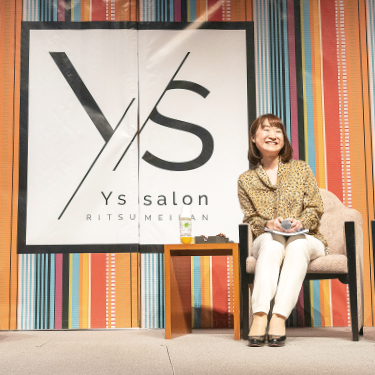- Matsubara
- Next is a question I suppose everyone wanted to ask. “Have you ever been in danger during field work?”
- Ogawa
- I might be already numb as to what danger is (laughter). When I saw one of my Tanzanian friends after a long time, he had grown so skinny and told me that he had failed in business and was mired in debt. When I asked him how much the debt was, it wasn’t a big amount, so I offered to pay it for him. When we got to the lender’s house, he told me to wait outside because it was embarrassing to let the lender know that he’d borrowed money from a girl. Later, when I learned that the house was a drug dealing spot, I thought he was a nice person. After all, he could have robbed me of everything I had, or even lured me to try the drug too. But instead, he told a petty lie and took what I could afford without hurting me. As a general rule, I believe the local people. You have to trust someone in order to avoid real danger. No matter how much basic information you collect, there are always risks. It is not as easy as simply saying that trust is ‘inviolable’, it is about taking a risk on friendship and camaraderie even in treacherous circumstances. In this way, I try to behave in the same way as the locals do when I feel that I am in danger.
- Matsubara
- I see. So when you conduct field work, you think and act like the locals, but are always careful not to overstep the mark. Is that right?
- Ogawa
- Yes. I am quite bold in terms of the situations I put myself in, but I try to make sure there’s a way out, of course.
- Matsubara
- Wow, anthropologists are no ordinary people. What would you say to this question, “How can I live an informal life in modern Japan?”
- Ogawa
- I would say don’t worry about formalities and live as you like! (laughs) If one talks about informal networks, for example, it’s even possible to form one the instant you create a group to exchange unwanted items on SNS.
- Matsubara
- Another question. “What do you think about basic income? It sounds like a good idea because it’s for everyone ... at least no one needs to feel indebted...”
- Ogawa
- Basic income may liberate people in some aspects and reduce the incidence of debt, so I think it’s worth giving it serious thought. However, I don’t think it necessarily has to be the same amount for everyone, but more flexible.
When I was in Tanzania, people would flock to me to beg for money because everyone thought that I must be rich, being Japanese. One day I got tired of this situation and thought, “I cannot live like this anymore!” I gathered my friends in my room (there were about 15 of them), opened my suitcase and yelled, “take whatever you want!” and gave everything away. To tell the truth, I had hidden 100 dollars in my bra as emergency money (laughs). When everyone had taken what they wanted, I said “Well now, I have helped you and your problems must have been solved. I will live here for five more months, and it’s your turn to help me.” Some of the things my friends took from me were handed on to other friends. As a result, there were many people who owed me something. After that, my friends helped me when I needed something.
When I wanted to visit a distant town, one of my friends would bring a truck driver with him. People would give me whatever they had in excess every day. I would then trade that with something I really needed and lived happily for five months without any problem. Those who can afford to give will give you what you want or need within the scope of their ability. What you need will come to you when you need it. I think this is the ideal mechanism. - Matsubara
- Your give-away party - I mean when you yelled, “Take whatever you want!” - it took place at an early stage of your research, is that right?
- Ogawa
- Yes.
- Matsubara
- ...and you said, “The result was, I was able to live happily without any problems.” This in itself seems to correlate with your research finding that the Tanzanian community and their human relationships in Hong Kong rely on speculative communication. Having put it into practice yourself before even knowing about it, do you feel you had some kind of inkling of the outcome in advance?
- Ogawa
- I felt that someone would help me, but if they didn’t, I was willing to be a pain and pester until they did.
- Matsubara
- One last comment from a participant: “I thought that one particularly fascinating aspect to the discussion today was hearing about a form of business and a pattern of human relationships neither of which are normal nor superficial, but both of which are, in a sense, very human.” I think this comment sums up today’s event well, and is, perhaps, a fine point at which to draw proceedings to a close for today’s Ys Salon. Thank you everyone.
 the Live Questionnaire System
the Live Questionnaire System
We exchanged views with participants in real time using the Live Questionnaire System.
How can I live an informal life in modern Japan?
I hear that a new class of poverty – “the digital poor” will emerge. Did you see that happen in Hong Kong?
What do you think about basic income? It sounds like a good idea because it’s for everyone ... at least no one needs to feel indebted...
Have you ever been in danger during field work?
One particularly fascinating aspect to the discussion today was hearing about a form of business and a pattern of human relationships neither of which are normal nor superficial, but both of which are, in a sense, very human.
In today’s Japanese society, acting according to plans and completing one’s task to reach a pre-established harmony are the norm. However, the real world is uncertain and unexpected accidents and mistakes do happen, and when they do, they are dealt with as a matter of individual responsibility. Listening to Professor Ogawa’s insightful report, I learned that Tanzanians accept the world with all its uncertainty and live with that uncertainty, relying on mutual aid rather than individual responsibility. Is it possible for the Japanese society or a capitalist world to accept the uncertainty of the world?
Inspired by Chungking Express a 1994 film written and directed by Wong Kar-wai, I started studying Chinese films. I used to think that Chungking Mansions were famous for accommodating people from India. I’ve visited Hong Kong quite a few times and saw Indian people hanging around Chungking Mansions, but maybe they were Tanzanians. I’d like to know what specific activities Tanzanians are engaged in at Chungking Mansions and how they share the buildings with the Indian people living there.




